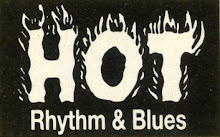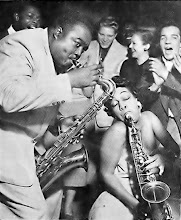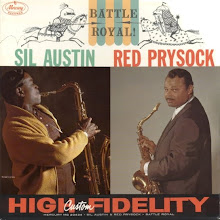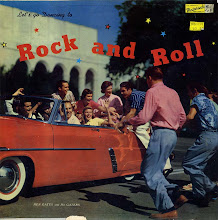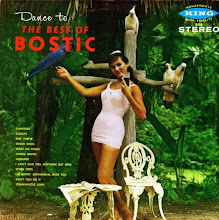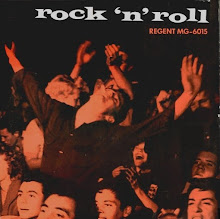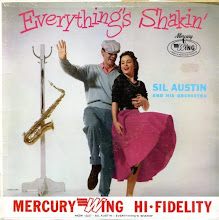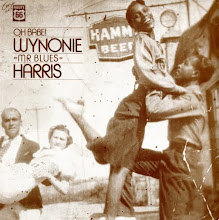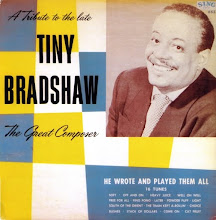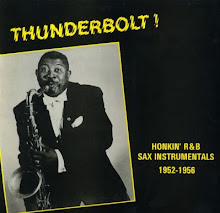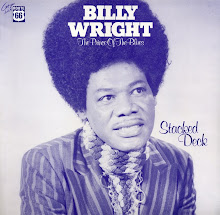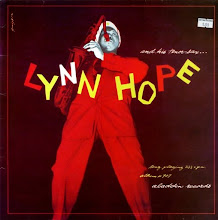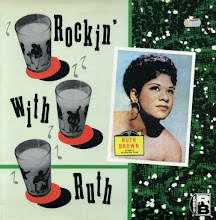Side 1:
01. Tiny's Boogie Woogie - Tiny Grimes' Swingtet
02. Hardee's Partee - John Hardee's Swingtet
03. Idaho - John Hardee's Swingtet
04. Tired - John Hardee's Swingtet
05. River Edge Rock - John Hardee's Swingtet
06. Bad Man's Bounce - John Hardee Quintet
07. Baby Watch That Stuff - John Hardee Quintet
Side 2:
01. Lunatic - John Hardee Quintet
02. Can't Help Loving That Man - John Hardee Quintet
03. Profoundly Blue - Tiny Grimes Quintet
04. Boogie Woogie Barbecue - Tiny Grimes Quintet
05. That Old Black Magic - Tiny Grimes Quintet
06. Blue Harlem - Tiny Grimes Quintet
Download from here:
Our little tribute to the Saxophonograph label (Saxophony!) continues with a homemade comp of Texas tenor man John Hardee who was an important part of the New York recording scene of the mid to late 1940s. He is often referred to as the "forgotten" tenor sax man, mainly because his career as a full time professional musician was short when compared to those of many of his contemporaries. This was not due to any lack of ability. In fact as you will hear, he was an outstanding musician whose tough tenor work was often highly praised. The reason for the brevity of his recording career was that he left New York some time in the early 1950s to take up a career as a music teacher in Texas.
John Hardee was born in Corsicana, Texas, in December 1918. He came from a musical family and while still living at home he played for local group Dan Carter's Blue Moon Syncopators. He enrolled as a music student at Bishop College in Marshall, Texas, but gave up his studies temporarily to tour with one of the major Texas territory bands, the San Antonio based Don Albert Band which at one time billed itself as "America's Greatest Swing Band." John joined in 1938, replacing Jimmy Forrest as a featured tenor sax player. In the summer of 1939 John left the band to resume his studies at Bishop, graduating in 1941.
During his military service (1941 - 1944) John was stationed at Nyack, New York, on the Hudson River, and during this time started to participate in jam sessions at Minton's in Harlem and at clubs on 52nd Street. On his discharge he and his wife set up home in Harlem and John's musical career soon took off. He is always associated with guitarist Tiny Grimes, with whom he recorded for Blue Note and Atlantic in 1946 and 1947 but he played on quite a few New York recording sessions for various important artists in the years 1946 - 1950.
His first recording session may have been for the Signature label with Dickie Thompson and his Blue Five some time in late 1945 (or perhaps 1946). This was the same Dickie Thompson who later recorded the original "Thirteen Women And One Man" which Bill Haley memorably revived. The two singles which resulted from the session, "Hand In Hand Blues" / "Tailor Made Gal" and "Swing Song" / "Stardust" weren't released until August 1946 and July 1947 respectively.
John's spell with Tiny Grimes on Blue Note kicked off in February 1946 with a John Hardee Swingtet session (with Tiny featured on guitar) which produced two singles, "Tired" / "Blue Skies" and "Idaho" / "Hardee's Partee". The latter single was outstanding with Jesse Stone's "Idaho" being given the full treatment by the guitar / sax duo of John and Tiny. John's own composition "Hardee's Partee" was a terrific mood piece.
On May 31st the John Hardee Swingtet recorded again for Blue Note ("River Edge Rock", "What Is This Thing Called Love?" inter alia) but this time without Tiny Grimes. The two were reunited at Blue Note on August 14th 1946 at a Tiny Grimes Swingtet session which resulted in "C Jam Blues"/ "Tiny's Boogie Woogie" and a frantic two part version of "Flying Home."
In August 1946 Blue Note released an album of three John Hardee 78 rpm singles called "John Hardee Tenor Sax" (BN 101). The album consisted of "Idaho" / "Hardee's Partee," "What Is This Thing Called Love" / "Nervous From The Service," "River Edge Rock" / "Sweet And Lovely."
 |
| Cover shot from Discogs.com |
In the meantime John was also featured on several Earl Bostic sessions for Gotham. In March 1946 the Bostic band, with Cousin Joe on vocals on some tracks, recorded several sides, including a powerful version of "That's The Groovy Thing." John was on further Bostic sessions with Cousin Joe in May and August with the resulting product being released either as by Cousin Joe, or in the case of several sacred sides (the August session), as by "Brother Joshua."
John played on two sessions for the "Hot Record Society", one in September 1946 as part of a group led by Billy Kyle, Billy Kyle's Big Eight which included Buddy Rich on drums, and later in the year for a group led by Russell Procope. On October 25th the Tiny Grimes Swingtet (including John Hardee) backed blues shouter Gatemouth Moore at a session for National with "Love Doctor Blues" being the outstanding track.
Another Tiny Grimes Swingtet backing session featuring Hardee, this time on Signature for shouter Walter Brown (late 1946 or early 1947), had a rather controversial outcome when a cover version of "Open The Door Richard" was withdrawn from sale by the record company because of allegedly blue lyrics. The story was reported in "Billboard" on 8th March 1947 with Signature prexy Bob Thiels being quoted as saying that he couldn't estimate the loss involved in view of the pressings already sold.
On April 2nd 1947 John played in Buck Clayton's Orchestra which backed Helen Humes on a session for Mercury. "Jet Propelled Papa," "Blue And Sentimental," "I Just Refuse To Sing The Blues" and "They Raided The Joint" were the resultant meisterwerks. In October he played on a Dan Burley and his Skiffle Boys session for Arkey - "Chicken Shack Shuffle" and "Skiffle Blues" were perhaps less than masterpieces, but John's contribution did somehow fit into the deliberately primitive (not to say archaic) goings on. We should pause briefly to note that activist, writer and entertainer Dan Burley wrote "The Harlem Hand Book Of Jive."
The John Hardee Quintet recorded a good session for Savoy in November 1947. "Baby Watch That Stuff" featured a Hardee vocal which was relaxed and pleasant. Two singles came from the session - "Baby Watch That Stuff" / "Bad Man's Bounce" (issued on Regent) and "Lunatic" / "Can't Help Loving That Man."
As 1947 drew to a close and the AFM recording ban loomed ever closer, the Tiny Grimes Quintet, complete with John Hardee, recorded four sides for new kid on the block Atlantic Records. The first single from the 29th December session was "Boogie Woogie Barbecue" backed with a revival of "Blue Harlem," the classic track that Tiny had recorded with Ike Quebec for Blue Note back in 1944. The follow up single was "Profoundly Blue" backed with a particularly rousing Hardee performance on "That Old Black Magic." Both "Blue Harlem" and "That Old Black Magic" sold reasonably well and helped Tiny Grimes to be numbered 47th best selling R&B artist in 1948.
When the Tiny Grimes Quintet returned to the studio in May 1948, John Hardee was no longer the featured tenor sax man as his place had been taken by Red Prysock. John featured in only two recording sessions in 1948. The first (in August or October) was a Clyde Bernhardt session for Savoy which produced one single - "Pretty Mama Blues" / "My Heart Belongs To Daddy." However the second session was a John Hardee Quartet session for Sittin' In With with two singles resulting - "Prelude To A Kiss" / "Bop In B Flat" (credited to The Four Bops) and "Man With A Horn" / "Cobblestones."
These were the last singles released under John Hardee's name. His recording activity was winding down and it is possible that he had moved back to Texas before the 1940s were out. In 1949 he was on one session for the Billy Taylor Quintet on Savoy. These were unusual recordings for the time as they featured both piano and organ. Recorded on November 20th 1949, the four sides remained unreleased for many years but two of them ("Misty Blues" and "Take The A Train") emerged decades later on a Savoy 2LP set, both credited to John Hardee.
In 1950 John was on two sessions for King Records. On September 12th he joined a small group of musicians from the Erskine Hawkins band to back singer Jimmie Mitchell. Other musicians present included Bobby Smith, Haywood Henry, Julian Dash, Rene Hall and Sonny Payne. On October 18th John took part in another King session, this time playing in the Lucky Millinder Orchestra backing Wynonie Harris. Two classic Wynonie sides resulted from the session - "Oh Babe!" and "Teardrops From My Eyes." Another product of the session was the famously risque Lucky Millinder track "Silent George" memorably hollered by Myra Johnson.
It is likely that John's last session in the 1940s / 1950s era was a reunion with Tiny Grimes for Gotham, either in late 1950 or 1951. By now the Grimes group was billed as Tiny Grimes and his Rocking Highlanders, complete with cod Highland dress - kilts, Tam O' Shanters and Prince Charlie jackets. One hopes that John Hardee was not required to appear in that get-up. Singles resulting from the session were - "Hawaiian Boogie" / "My Baby's Cool," ""Rockin' And Sockin'," / Howling Blues," and "St Louis Blues" / "1626 Blues."
And that was almost the end of John Hardee's recording career. He moved back to Texas at some point in the late '40s or early '50s and took up a teaching post in Wichita Falls. In 1955 he moved to Dallas where he taught at Oliver Wendell Holmes High School until his retirement in 1976. He continued to play locally
as a reminiscence in a YouTube comment vividly describes.
In 1975 he played at the Nice Jazz Festival in France and recorded an LP, "A Little Blue" for the French Black & Blue label on the 26th July 1975 in Antibes.
John Hardee passed away in Dallas on the 18th of May, 1984.
The tracks on "Bad Man's Blues" -
"Tiny's Boogie Woogie" was recorded in New York City on August 14th, 1946. Personnel: Trummy Young (trombone); John Hardee (tenor sax); Marlowe Morris (piano); Tiny Grimes (guitar); Jimmy
Butts (bass); Eddie Nicholson (drums).
released on Blue Note 525 b/w "C Jam Blues" by Tiny Grimes' Swingtet in November 1946.
"Hardee's Partee," "Idaho," and "Tired" were recorded in NYC on 28th February 1946. Personnel: John Hardee (tenor sax); Sammy Benskin (piano); Tiny Grimes (guitar); John Simmons (bass); Sidney Catlett (drums).
"River Edge Rock" was recorded in NYC on 31st May 1946. Personnel: John Hardee (tenor sax); Bill Bivens (vibraphone); Sammy Benskin (piano); Jimmy Shirley (guitar); Gene Ramey (bass); Sidney Catlett (drums).
"Tired" / "Blues Skies" by John Hardee's Swingtet released on Blue Note 513 in July 1946.
"Idaho" / "Hardee's Partee" by John Hardee's Swingtet released on Blue Note 514 and on Blue Note album BN-101 (John Hardee Tenor Sax) in August 1946.
"River Edge Rock" / "Sweet And Lovely" by John Hardee's Swingtet released on Blue Note 521 and on Blue Note album BN-101 (John Hardee Tenor Sax) in August 1946.
"Bad Man's Bounce," Baby Watch That Stuff," "Lunatic," and "Can't Help Loving That Man" recorded in NYC in November 1947. Personnel: Ludwig Joe Jordan (trumpet); John Hardee (tenor sax,vocal); Billy Kyle (piano); John Simmons (bass); Cozy Cole (drums).
"Baby Watch That Stuff" / "Bad Man's Bounce" by the John Hardee Quintet released on Regent 121 in July 1948.
"Lunatic" / "Can't Help Loving That Man" by the John Hardee Quintet released on Savoy 703 in August 1949.
"Profoundly Blue," "Boogie Woogie Barbecue," "That Old Black Magic," and "Blue Harlem" were recorded in NYC on the 29th December 1947. Personnel: John Hardee (tenor sax); George Kelly (piano, celeste); Tiny Grimes (guitar); Lucille Dixon (bass); Sonny Payne (drums).
"Boogie Woogie Barbecue" / "Blue Harlem" by the Tiny Grimes Quintet released on Atlantic 854 in February 1948.
"Profoundly Blue" / "That Old Black Magic" by the Tiny Grimes Quintet released on Atlantic 858 in June 1948.
Sources:















































